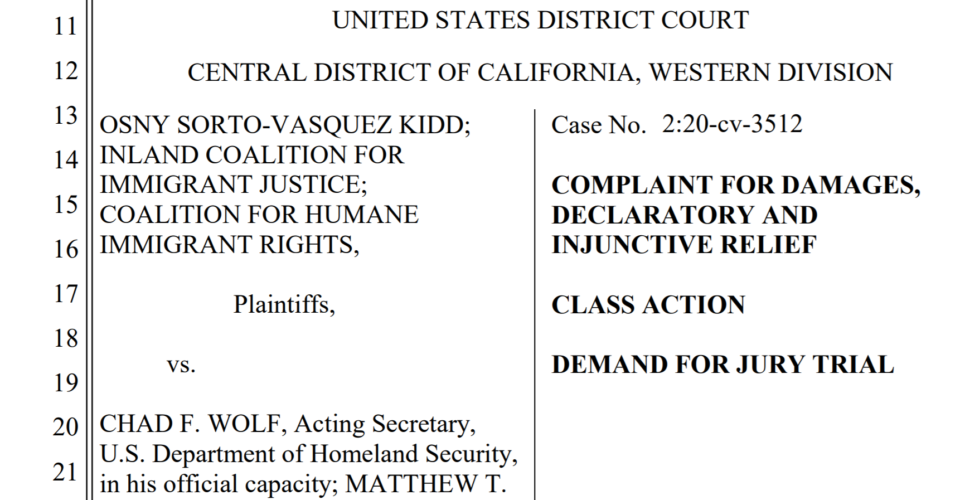“Even if a person has a past criminal conviction, even if a person has previously been ordered, deported, they do not deserve to have their constitutional rights violated when ICE comes to arrest them,” Lai said. “ICE may have the ability to arrest them, but ICE does not have the ability to arrest them in violation of the Constitution.”
By EDUARDO GARCÍA
EL NUEVO SOL
LOS ANGELES, April 18, 2020—A class-action lawsuit was filed Thursday morning against U.S. Immigration and Customs Enforcement (ICE) to force its agents to stop the impersonation of other government agents and stop using deceptive tactics to gain entry without a warrant.
ACLU, UCI Immigrant Rights Clinic and other law firms filed the lawsuit at 9:20 a.m. on behalf of lead plaintiff Osny Sorto-Vasquez Kidd, a 25-year old DACA recipient and health care worker. He said officers deceived him and his family on his consent in the morning of Oct. 1, 2018, leading to his arrest two days later.
That morning while Kidd was not at home, his mother called him, crying, and could also hear his siblings crying in the background. She said the police were at her home questioning her and her children because a ‘dangerous man’ was out to get them.
He said someone handed the phone to a woman who later described herself as a detective working with the local police department. Terrified, he said he asked if his family was OK, and she said ‘yes.’ She told him the individual was using their name and address and could harm them.
Kidd added that while he wasn’t home at the time, she insisted on meeting with him. He said he did it to ensure his and his family’s safety by complying with what he thought was the police, unaware they were ICE agents.
“On Oct. 3, early morning, the detective called with a ‘No Caller ID’ and demanded to meet with me outside my apartment complex,” Kidd said. “I noticed my building was surrounded by four black [vehicles]. I remember being scared, terrified.
“As I approached the gate, the detective and two other officers shouted, ‘Everything’s OK’ and to meet with them at the gate. They requested to see my ID, and upon confirming my identity, they handcuffed me.
He added: “I remember the detective’s words were, ‘Please don’t cry. The stories made up to get to you. There is no man looking to harm your family.”’
Kidd said the ‘detective’ revealed herself as an ICE agent and was there to deport him because of an outstanding final order of removal on his name. He was shocked and expressed his anger for targeting him and his family with their well-being. He told her he was a DACA recipient, which protected him from deportations.
“She replied saying I had a final order and no case around the final order,” Kidd said.
Annie Lai, a professor at the UCI Immigrant Rights Clinic, said the lawsuit is not limited to those who have DACA or are undocumented. She said it challenges any ICE arrest that is done in violation of the U.S. Constitution and federal law.
“Even if a person has a past criminal conviction, even if a person has previously been ordered, deported, they do not deserve to have their constitutional rights violated when ICE comes to arrest them,” Lai said. “ICE may have the ability to arrest them, but ICE does not have the ability to arrest them in violation of the Constitution.”
Lai said homes have high levels of protection under the Fourth Amendment of the Constitution, with some very limited exceptions. She said ICE officers cannot enter the home or certain protected areas around the home without a judicial warrant or consent.
She said when police would go to a person’s home to arrest him or her, they would have a warrant signed by a judge.
“However, ICE rarely, if ever, has such a warrant,” Lai said. “It primarily relies on residents’ consent to get into the home, but to get this supposed consent, they are relying on lies and deception.
“The term, ‘impersonation’ can describe any number of scenarios, but the type of impersonation we are specifically challenging in this lawsuit is when ICE pretends to be another government agent, such as local police or probation [officers] there to investigate a crime or carry out some other made-up government business,” Lai said.
Lai said ICE’s purpose is immigration enforcement, adding they’re not saying they’re there for that purpose. She said it is unconstitutional for ICE to engage in the type of deception that gives them consent to enter people’s homes.
“In those cases, the “consent” is invalid because it is not really voluntary,” Lai said. “For similar reasons, it is also unconstitutional for ICE to use this type of deception to convince a person to leave the privacy of her or his home and step outside.”
Lai said another claim to the lawsuit includes challenging that before ICE gets residents to open the door, they’re illegally crossing the curtilage, or the private areas around the home. She said the curtilage is constitutionally protected without a warrant or consent.
Lai added the lawsuit challenges ICE’s practices as violating its agency’s own rules and regulations.
Finally, Lai said the non-class action part of the case is compensation for Kidd for the harm he suffered.
Michael Kaufman, Sullivan and Cromwell Access to Justice senior staff attorney at the ACLU of Southern California, explained deception patterns ICE would use to gain consent and entry to people’s homes.
“ICE officers arrive in the early morning hours, loudly bang on doors and wear plain clothes or black uniforms and blazoned with the word ‘police,” Kaufman said. “When a resident comes to the door, the ICE officers lie about their identity and purpose. For example, they will announce that they are police investigating the crime and ask for the resident’s help.
“In other cases, they identify as police, state that there was a problem with the resident’s car and ask them to step outside,” Kaufman added. “In some cases, ICE officers identify themselves as probation officers, better there for a routine checkup. Only after the resident steps outside or permits the officers inside do the ICE officers reveal their true identity and purpose to arrest the person.”
To learn more information about your rights and how to report ICE’s actions, visit aclusocal.org/en/icenotwelcome
To learn more about the class-action lawsuit, visit aclusocal.org/sites/default/files/kidd_v_wolf_-_complaint.pdf











